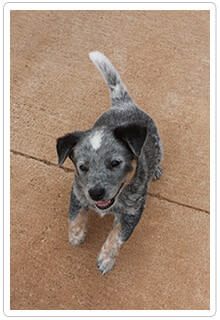
The Essentials
What basic items do I need for my puppy? Quality puppy food is a given; take a look at the ingredients to make sure you've chosen food that is formulated for puppies and has meat as the first ingredient rather than food that is full of filler. Treats are great training tools for your new puppy but should not make up more than 5% of his daily diet. When your new puppy comes home he'll want a few interactive toys to keep him busy, as well as a nice comfy bed to snuggle up on when he's worn out from puppy play time.
One of your first purchases (if not provided with your puppy) will be a collar and leash. The collar should fit just right - not too tight and not too loose. Next is an ID tag with your puppy's name and your phone number. Microchipping is a good idea to ensure your puppy can be found if he were to ever get lost. Plus, the cost of a microchip is covered with Embrace Wellness Rewards†.
Health & Wellness
What do I need to keep my puppy healthy? Keep a puppy first-aid kit around the house for little emergencies. You'll also want to have grooming and dental supplies such as canine shampoo, a gentle brush, and a toothbrush and toothpaste that are made for dogs. Your veterinarian should suggest flea, tick & heartworm medication (covered with Embrace Wellness Rewards). Follow directions from your vet and the packaging to treat your puppy accordingly.
Training & Development
What do I need to help train my puppy? Crate training is important; A crate will give your puppy a place to call his own, and a place where you know he'll be safe. Clicker training tells your puppy he's done something right with the sound of a click, rewarding good behavior instead of punishing bad behavior. If your puppy is easily scared, calming products can help ease anxiety related to thunderstorms, mail carriers, other animals, etc.
Important "To-Do's"
What do I need to do for my new puppy? Before picking up your new puppy, you'll want to puppy-proof your home just like for a child. Put away anything you don't want your puppy to chew, including electrical cords and poisonous products or plants. Baby gates work well to guard off-limit areas inside. Outside, be sure to inspect fences for holes, gaps or loose sections. If your yard is open, consider a lead line or an invisible fence.
Your new puppy should see a veterinarian early on to assess his overall health and to discuss all things puppy-related. Even expert pet owners can learn something new at the vet. Other professionals you'll want to research are pet sitters, doggie day care facilities, and groomers, if necessary. Last but certainly not least, it is important to consider dog insurance for your new puppy.